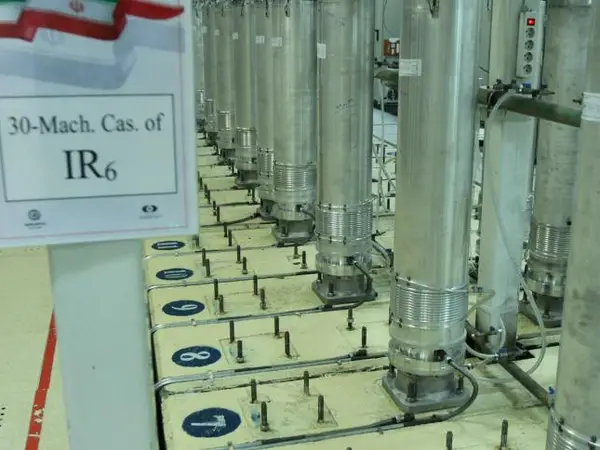Israel’s military intelligence chief has claimed Iran is near to escalating its nuclear program with 90-percent-enriched uranium, widely deemed ‘weapons grade.’
In an address to a conference of Tel Aviv University’s Institute for National Security Studies, Major-General Aharon Haliva said Monday he saw “at this point time… no real danger to the regime” from domestic protests but that “the moment is coming…when Iran entertains enrichment at 90 precent, even if only symbolically.” He said this would present “the greatest test of the international community.”
Shortly before leaving office 2021, then president Hassan Rouhani said Tehran had reached the capacity to enrich to 90 percent, and would do so “if one day our reactors need it.” This was just two years after Iran began enriching above 3.67 percent, the limit set by the 2015 nuclear agreement abandoned by the United States in 2018.
While 90-percent-enriched uranium can be used in some research reactors to produce medical isotopes, Rouhani’s remarks were seen as an attempt to secure leverage in talks to revive the 2015 agreement, the JCPOA (Joint Comprehensive Plan of Action), and so remove US ‘maximum pressure’ sanctions introduced in 2018.
Israeli leaders opposed the JCPOA and have criticized talks aimed at reviving it, while Israel is generally thought responsible, since 2010, for a series of killings of Iranian scientists and attacks on Iranian nuclear facilities, which have inflicted damage but also hardened attitudes in Tehran.
‘On the whole field, from nuclear to riots’
While some analysts and security officials in Israel have seen the over-riding dangers of nuclear proliferation as a reason to support the JCPOA, Haliva’s address Monday reflected a view of Iran as wider threat. “Iran is on the whole field, from nuclear to riots,” he said, claiming Tehran had considered disrupting the soccer World Cup, which started Sunday in Qatar.
“The only thing holding them back is how the Qataris will react,” Haliva said, presumably referring to Tehran’s generally good relations with Doha, which has sometimes mediated between Iran and the US. Monday saw Iran lose their opening game in the World Cup 6-2 to England.
Haliva said that current protests in Iran, which began mid-September, were different to earlier ones: “I think the protests have already shifted, to a degree, to the realm of a popular uprising…When you look at some of the incidents, even the hours at which they are taking place, the damage to national institutions, to symbols of the state, at the number of fatalities, there is something different happening here that is greatly troubling the regime.”
But while he suggested “prophecy, in the context of the conduct of societies,” was not the role of military intelligence, Haliva cautioned against expecting any dramatic changes in the near future. “At this point in time I see no real danger to the regime,” he said.
